The Varla Pegasus electric scooter is marketed as a daily-use scooter for commuters around cities and urban areas. Some of the features that make it ideal for city life include:
Top speed of 28 MPH
Wide, long deck
Solid rubber tires
All-wheel drive
Headlight and taillight
But I don’t think it’s just for commuters–it’s also a great “micromobility” mode of transportation for vanlifers. Any vanlifer knows the dread of losing a great camp spot because they had to drive away from it for the day. Or the headache of having to pack up and secure their whole tiny home in order to run a quick errand.
That’s where an e-scooter can be really convenient to have on-hand: run quick, local errands or go on day adventures without having to drive your whole home around. The scooter also takes up less space in a campervan than a bicycle.
Overall Review on Varla Pegasus E-Scooter
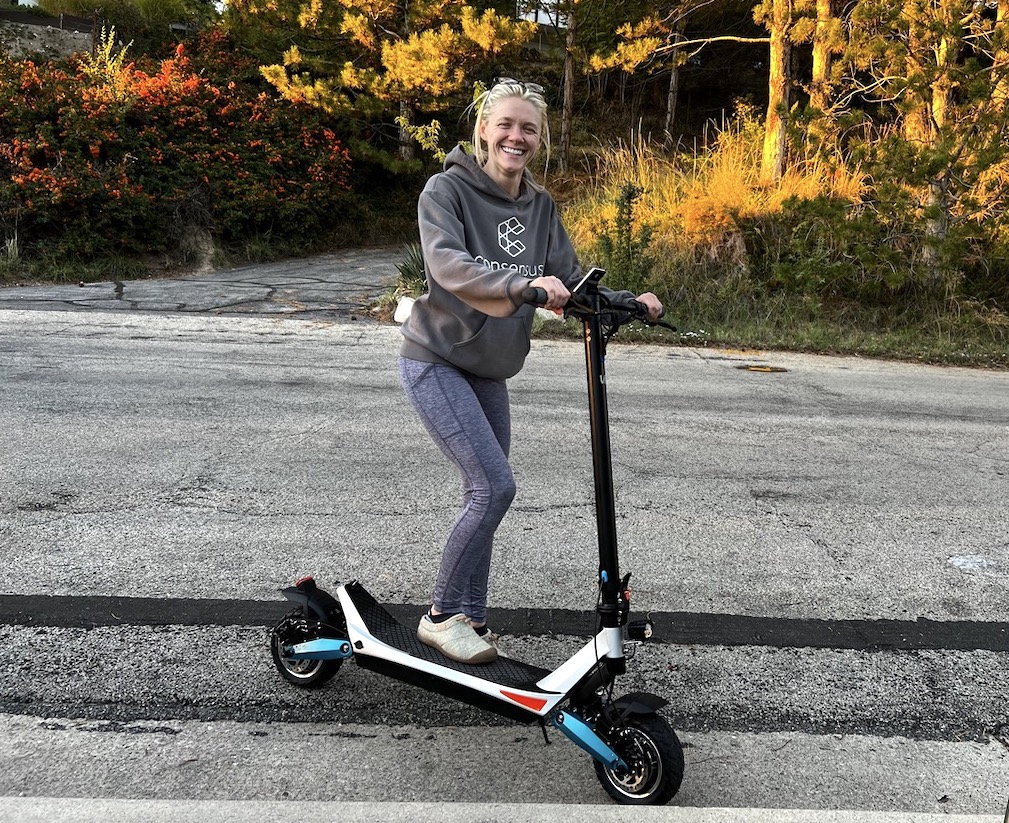
My only previous experience on e-scooters is with the public, rentable ones such as Lime and Birdie scooters. And let me say, the Varla Pegasus is leagues ahead of them. The rentable ones felt like riding a basic foot scooter with slow pickup but easy maneuverability. The Varla Pegasus truly feels like you’re on a powerful, motorized vehicle that can handle any bumps or curbs with ease, but takes a little getting used to because it’s just bigger and has more OOMPH than the rentable ones.
The Pegasus will provide you with a smooth ride as you cruise through the streets (or sidewalks). Its fast pickup acceleration and responsive brakes can help you keep up with the flow of traffic while staying safe. Its long, wide deck and solid tires allow you to glide over potholes or curbs and avoid wobble at higher speeds. With dual suspension and dual motors, all-wheel drive capability and three speed zones (maxing out at 28 MPH), you’re gonna have a lot of fun riding from point A to point B.
Just keep in mind that it drives a bit stiffer than the public rentable e-scooters. It’s also taller, longer, heavier (66 lbs.) and higher-up off the ground. It goes faster and its thumb throttle is more touchy than the rentable ones. Which means it actually has better pickup, and once I adjusted to it, I now like it that way.
Varla Pegasus Quick Facts
According to Varla, the Pegasus:
is powered by a 500W (x2) hub motor
is recharged via a 48V/15.6Ah lithium-ion battery
can reach up to 28 miles per charge
has a top speed of 28 MPH
is rated for up to 25-degree slopes
can carry a max weight of 280 lbs
but brand recommends no more than 250 lbs. to not compromise performance
weighs 66 pounds
is all-wheel drive
comes with headlight and taillight
boasts dual spring suspension
features a built-in folding mechanism
The Varla Pegasus E-Scooter Comes With:
AC charging cable and charger
4 spare brake pads
spare deck loop
bike bell that can attach to handlebars
chain lock clamp and lock keys
manual
hex key
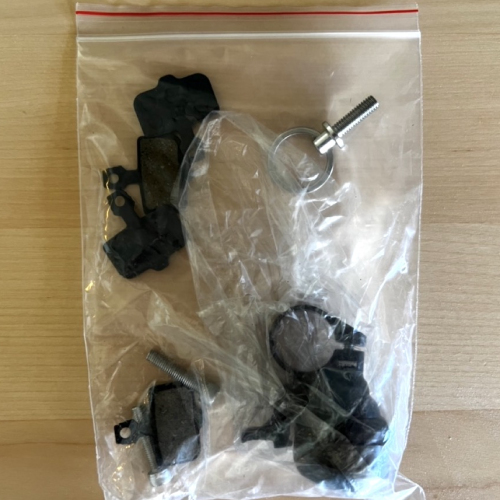
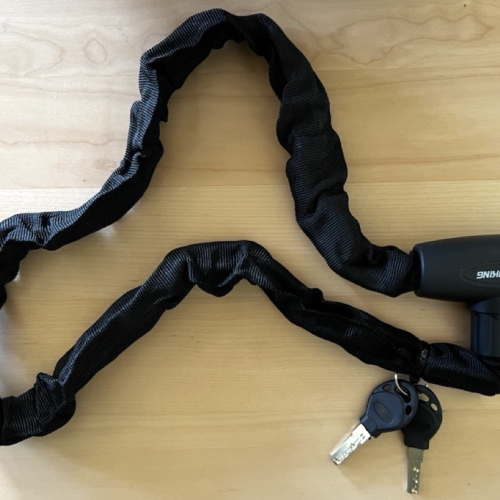
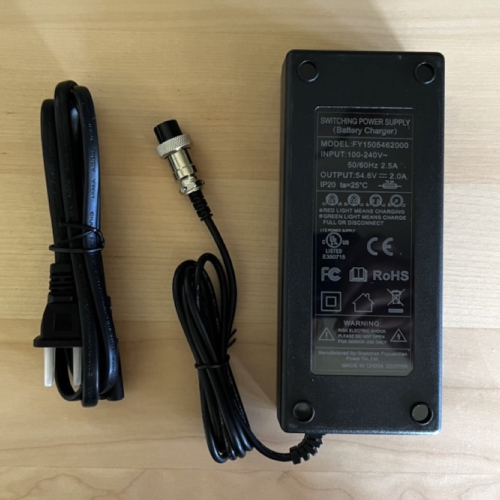
Setting Up the Varla Pegasus
My huge Varla scooter package arrived and after unpackaging it I started the setup process.
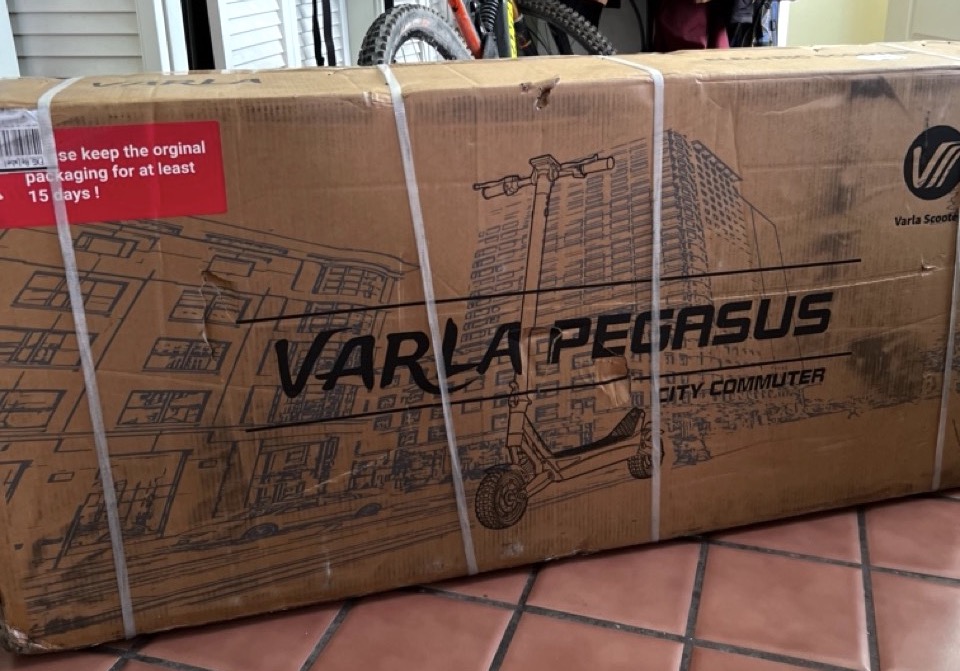
Thankfully, there isn’t a whole lot to set up. The biggest piece was attaching the LCD display to the handlebars, and the handlebars to the stem. It came with a hex key and the directions were pretty sparse, so it took a little figuring out to understand.
PRO TIP: the stem plate is already screwed-in to place when you receive the scooter, but you have to unscrew it in order to attach the handlebars.
1) Unscrew the stem plate
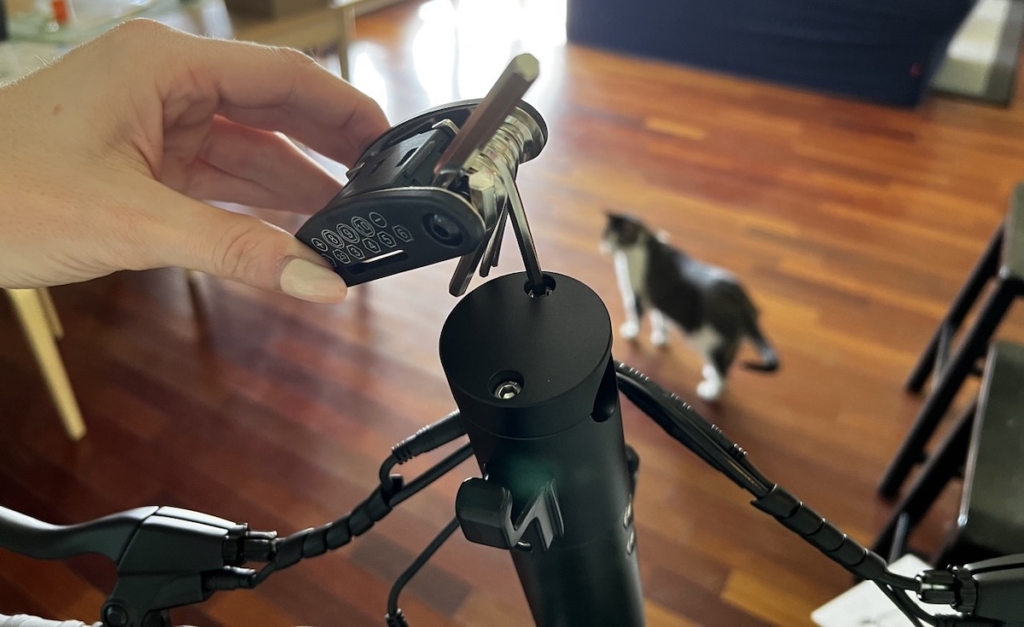
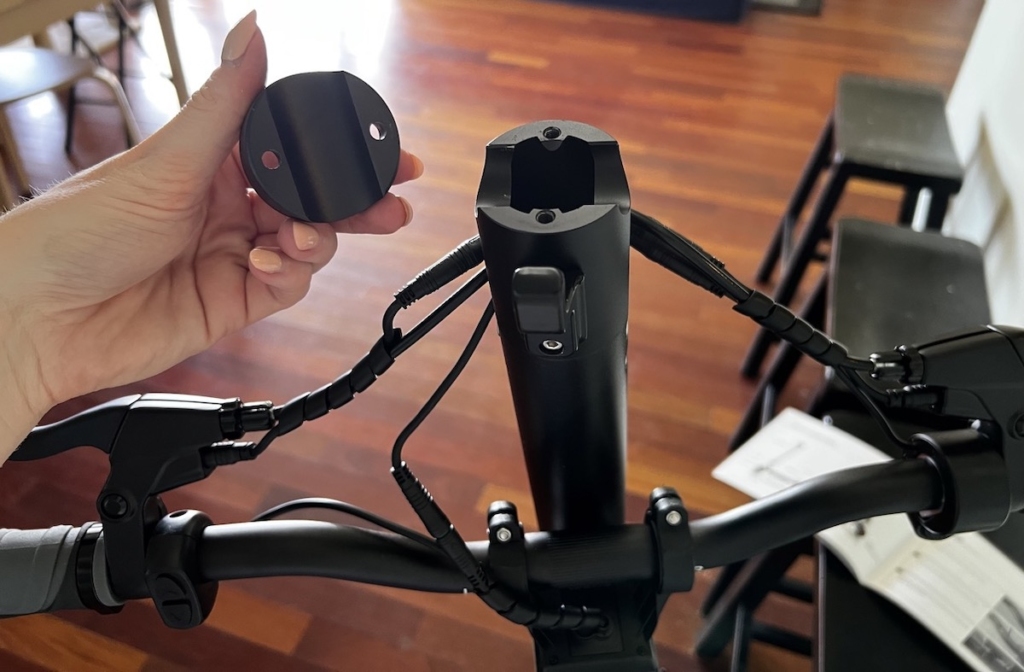
2) Place handlebars into handlebar divot, adjust and center properly. Put stem plate over handlebars and screw back in.
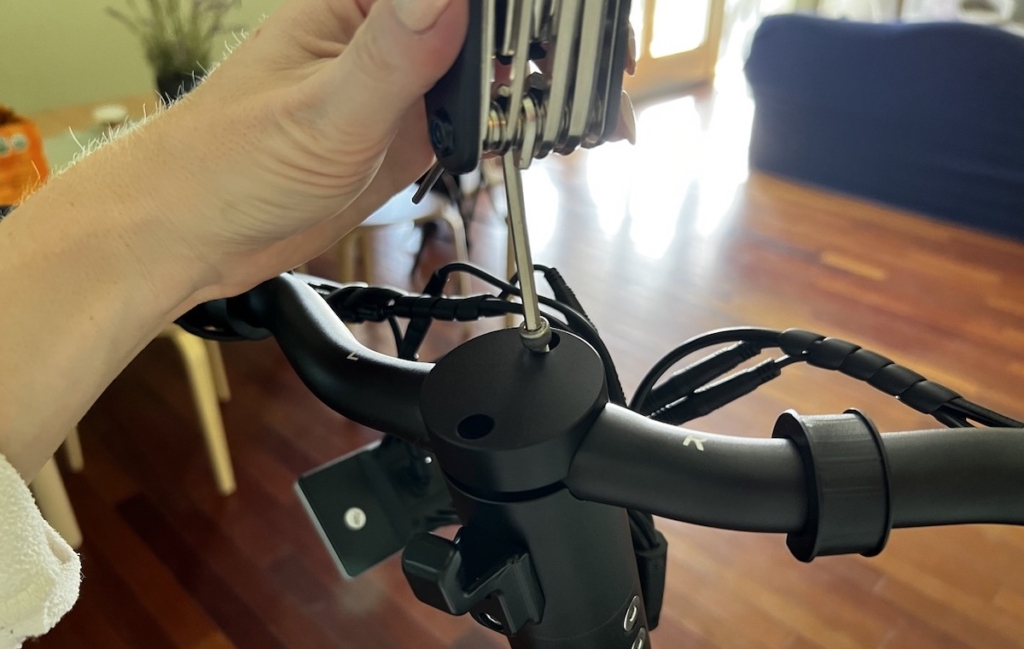
3) Place LCD display onto handlebars and screw into place.
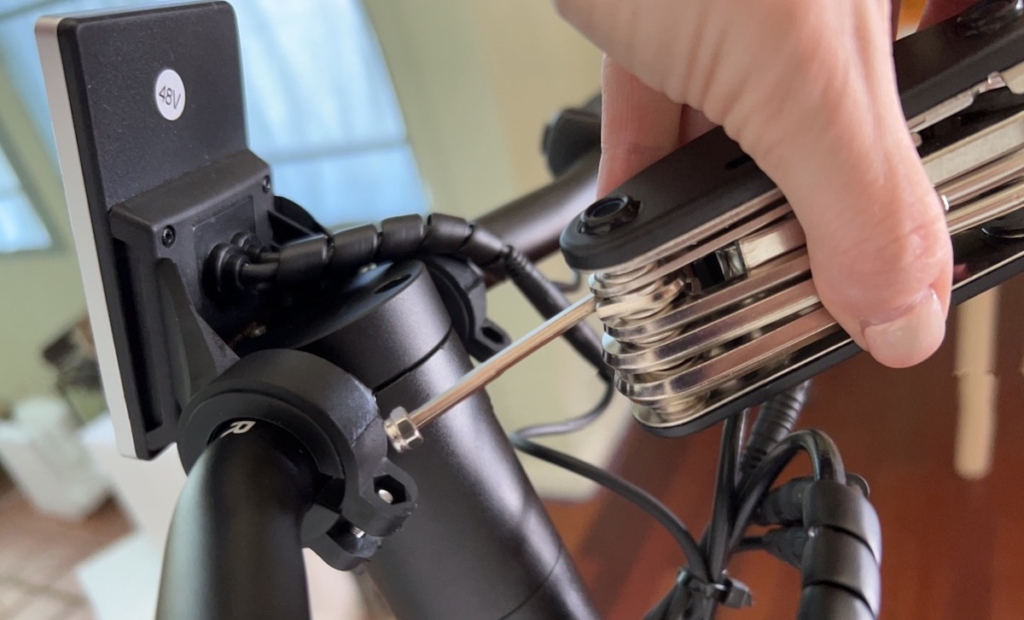
Voila! Your e-scooter is ready for its maiden voyage.
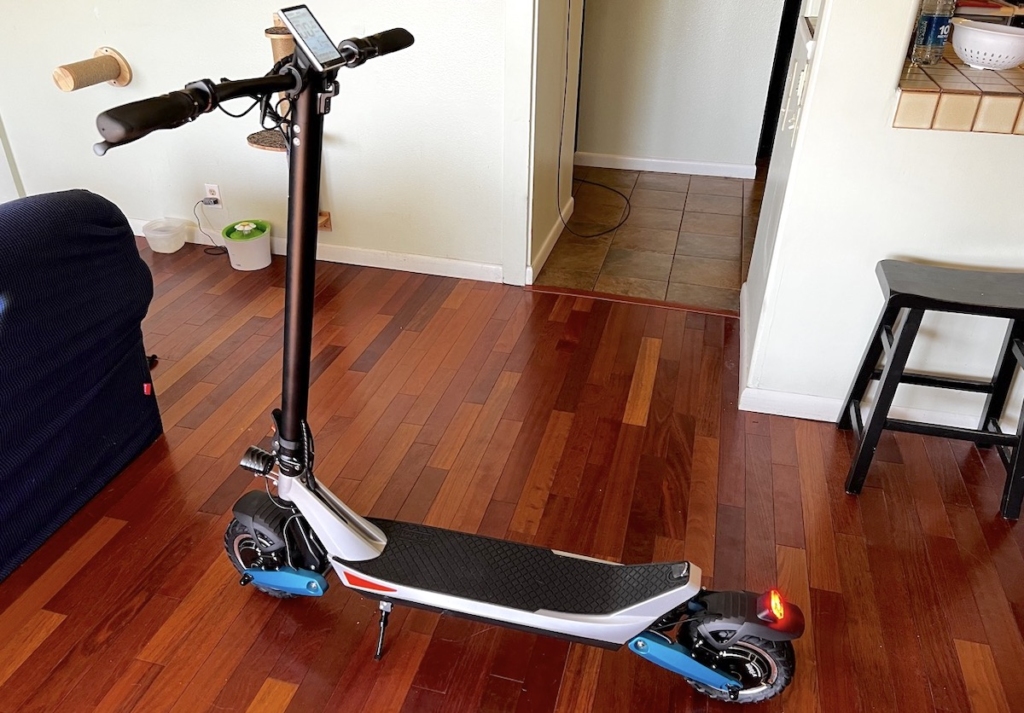
Steering Bar and LCD Display Screen
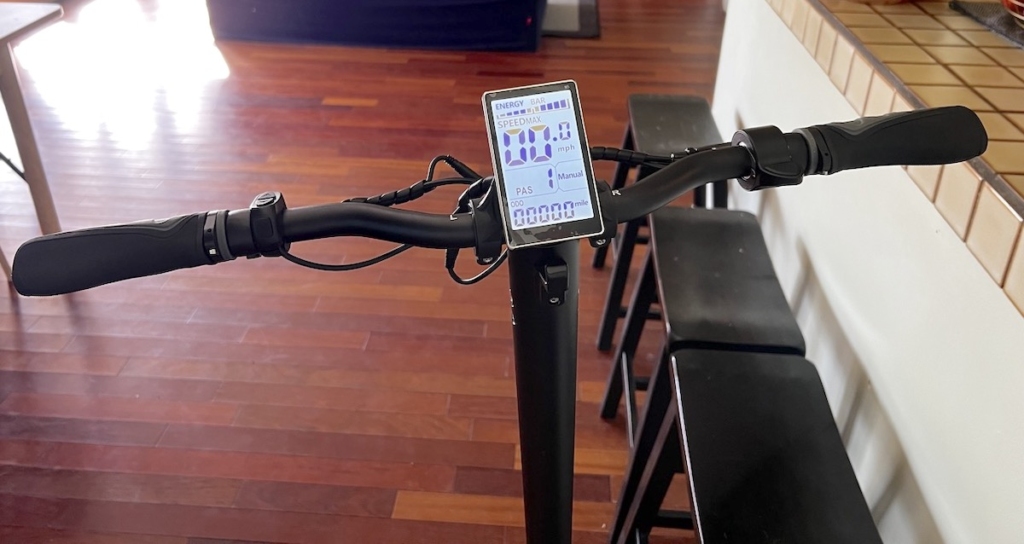
Since the handlebars arrive detached from the stem of the scooter, you can set the custom angle you desire when installing them. The handlebars are sturdy with cushioned hand grips on each end. All of the controls are on the handlebars for quick and easy access.
The LCD display can also be custom set to your desired angle. It’s a very straightforward, intuitive display that tells you how many lifetime miles the scooter has traveled, its current battery level, your current travel speed (MPH) and what speed zone you’re in. It’s also where you’ll be notified if there’s an issue with scooter (ie battery under voltage, brake faulty) via error codes. The manual covers each LCD display error code.
Brakes, Acceleration & Kickstand
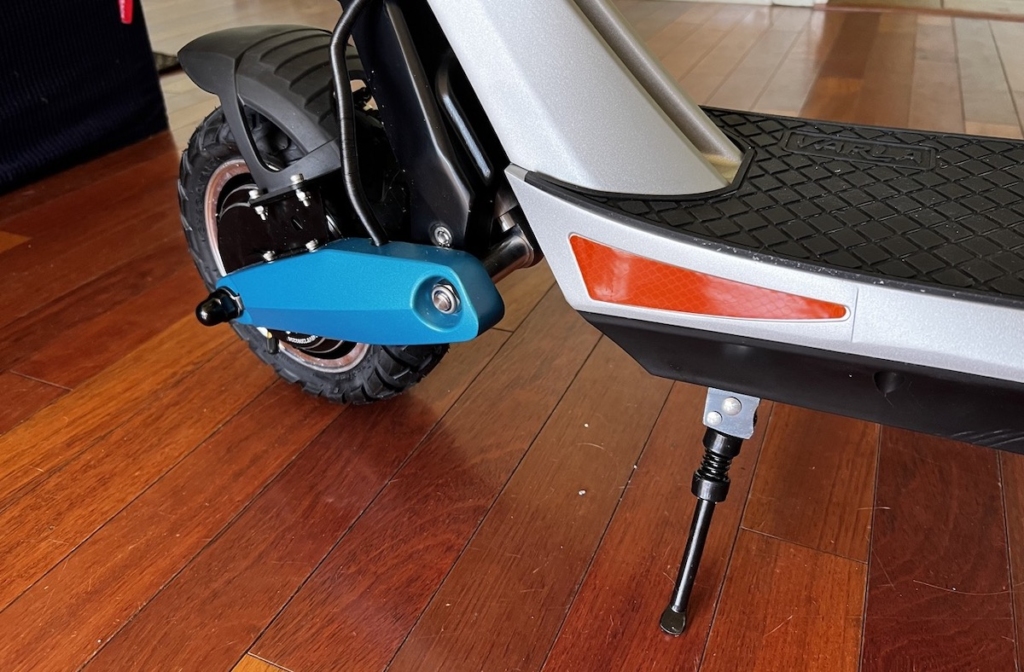
The acceleration is through the thumb throttle on the (driver’s) right side of the handlebar. As mentioned, the throttle is very responsive and you can get up to a fast speed within seconds. It takes some getting used to because it’s easy to jerk your scooter forward if you aren’t consistently smoothy pressing the throttle.
There’s a front and rear brake and the manual states that you should always use both at the same time if you are going faster than 10 MPH (AKA in speed zones 2 or 3). I found both brakes provided excellent braking distance–they are responsive but not so much so that it abruptly stops you.
The scooter’s kickstand is a small but critical feature. It’s super easy to kick up or down on takeoff but remains discrete. It provides just enough tilt for the scooter to stay put, but not risk tipping over.
Deck and Suspension
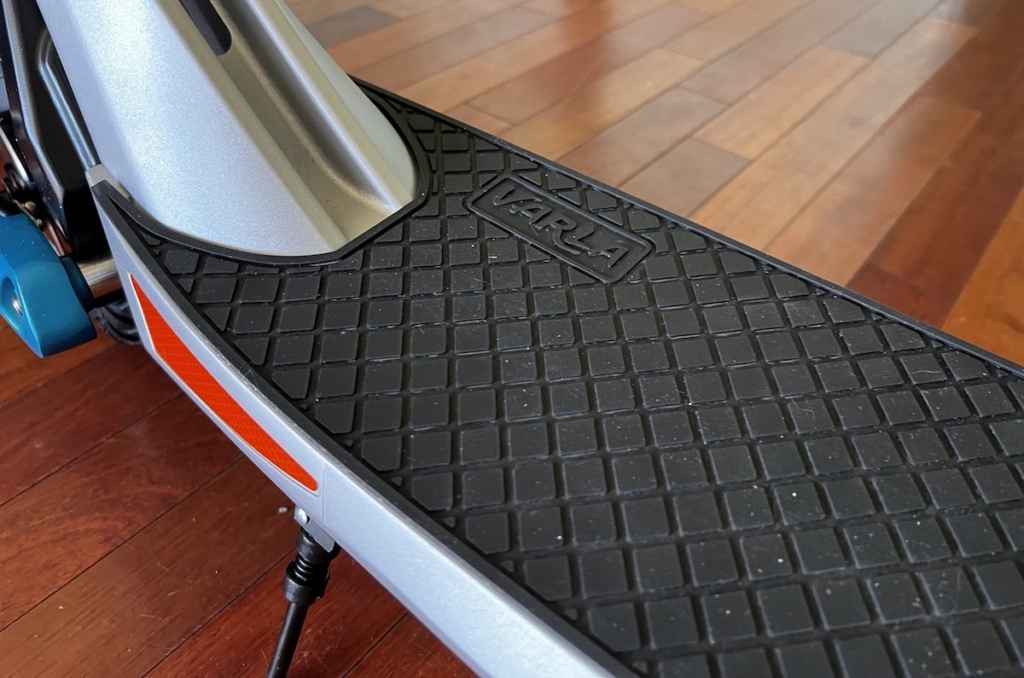
The deck measures in at nearly 8″ wide and 23.6″ long, which gives plenty of room and stability for even the largest feet. My brother and dad took spins on the Pegasus and they are NOT small guys, but the scooter fit them. They are each over 6′ tall and around 200 lbs, and the deck and dual spring suspension provided them with a comfortable riding experience. The deck material is silicone, which makes for a very grippy but cushioned and soft deck.
Folding Mechanism and Deck Loop
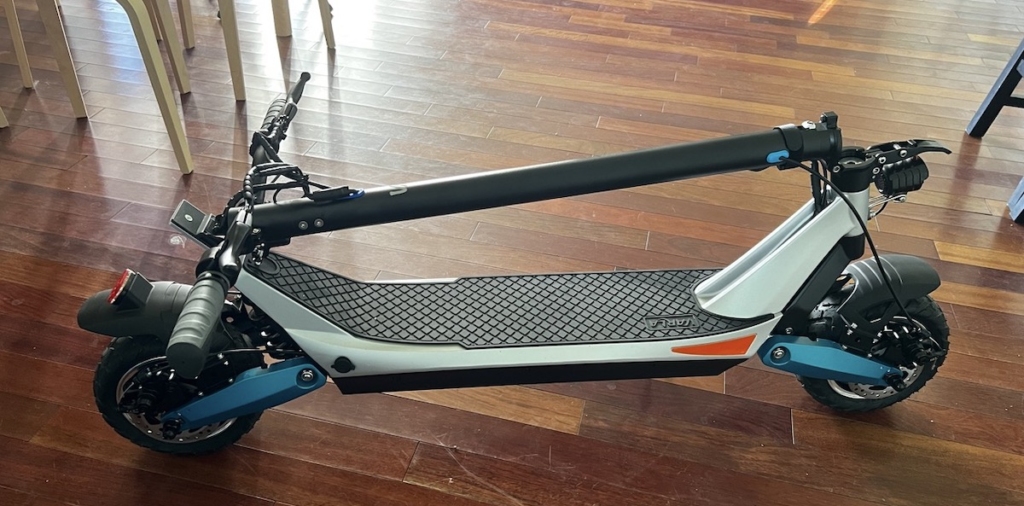
Like most scooters, the Pegasus has a folding mechanism at the base of the stem so the scooter can fold in two. Once folded, the steering bar hooks onto the “deck loop”, which is a circular piece of metal screwed into the back of the deck.
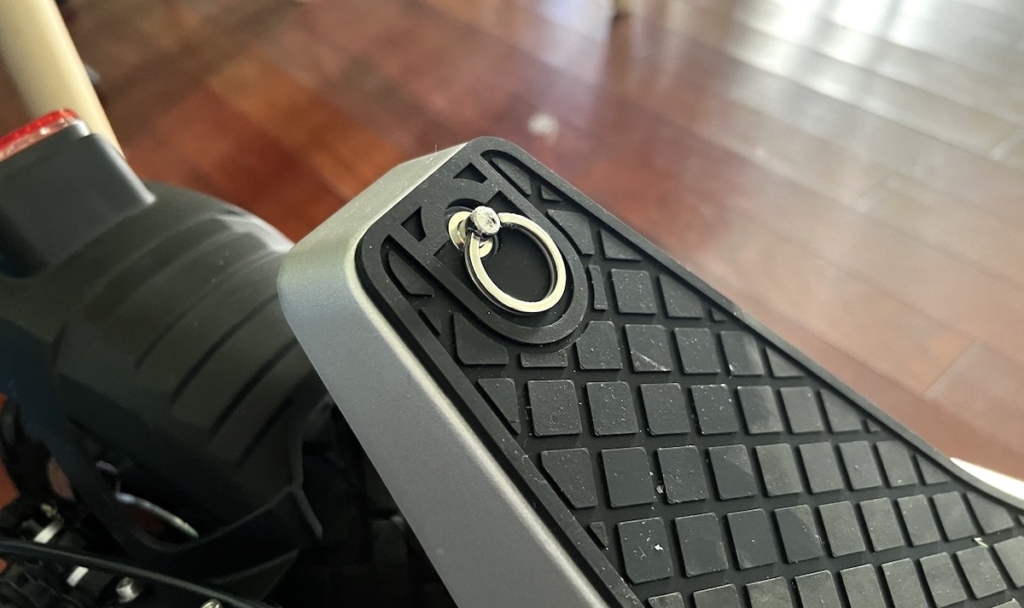
I think the folding mechanism and deck loop are the only slightly weak points of the scooter’s build quality. The deck loop is a thin piece of metal responsible for carrying at least 66 pounds at any given moment. Which maybe it can handle just fine, but the loop itself easily slides off of the hook that’s supposed to keep it attached to the steering bar. You won’t want to jostle around the scooter while carrying it, since it could slip off and then it will come unfolded on you.
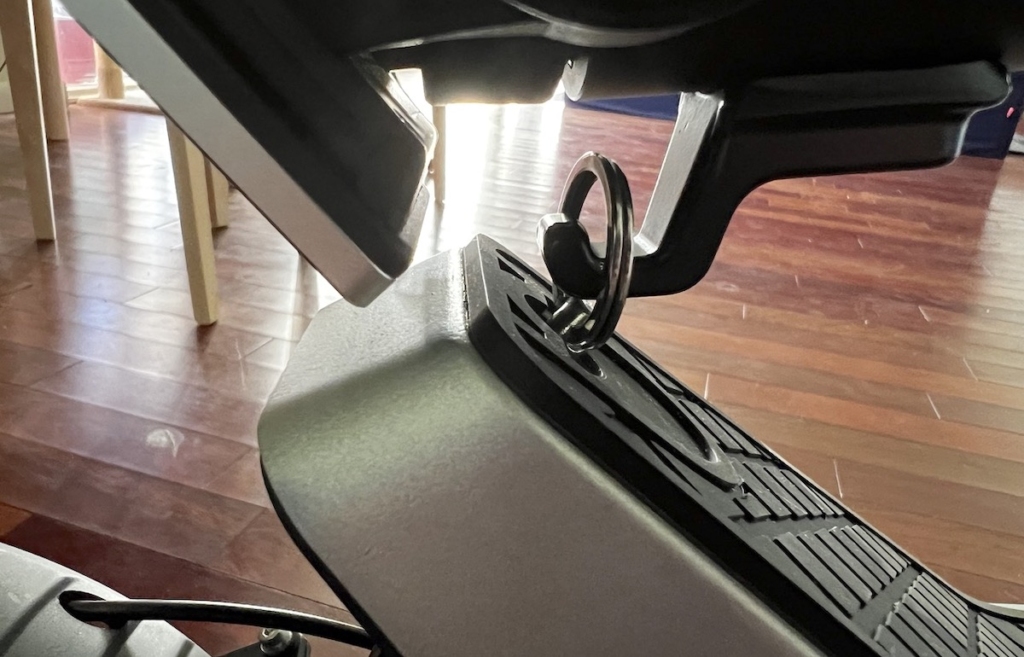
The lock clamp where the stem locks into place when upright, doesn’t exactly “click” into place, which makes it hard to know if it’s actually locked. I haven’t had any issues yet but hope it stands the test of time.
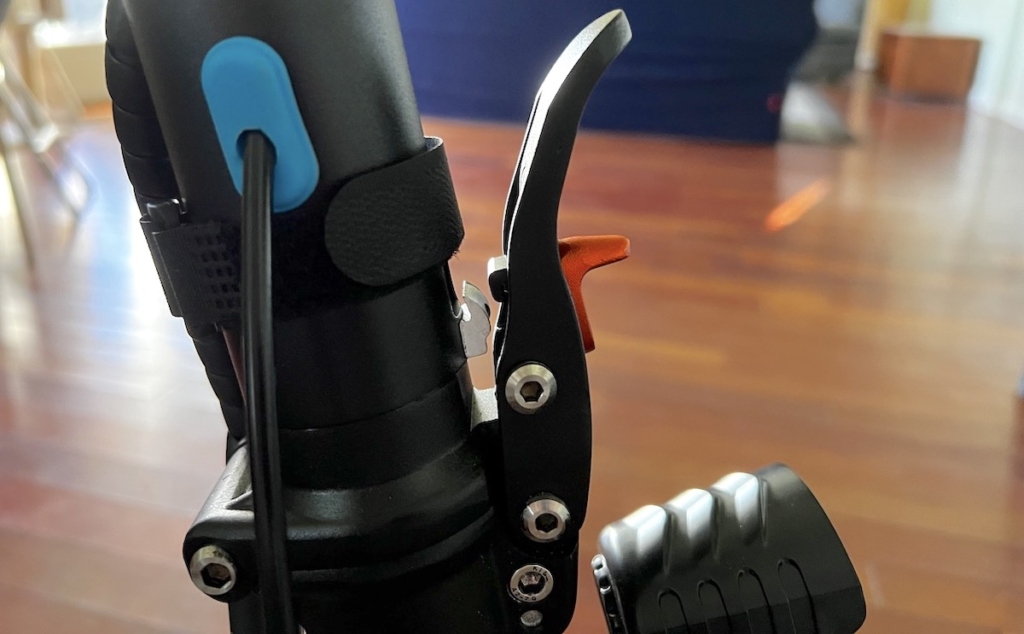
Weight, Portability, Headlights and Taillights
The Varla Pegasus electric scooter weighs 66 pounds, with more of the weight distributed in its back wheel area. Its weight hinders its portability a little because picking it up takes quite a bit of effort. But it still outperforms its competitor, the Segway KickScooter P100 which is also made for commuting and weighs a burly 73 pounds.
I love the headlight and red taillight that come installed on the Pegasus. The taillight automatically flashes when you brake and you can adjust its brightness via the LCD display. Manually turn the headlight on or off (I’d consider this more of a safety feature for cars to see you, versus as a single source of light to help guide you on dark night rides).
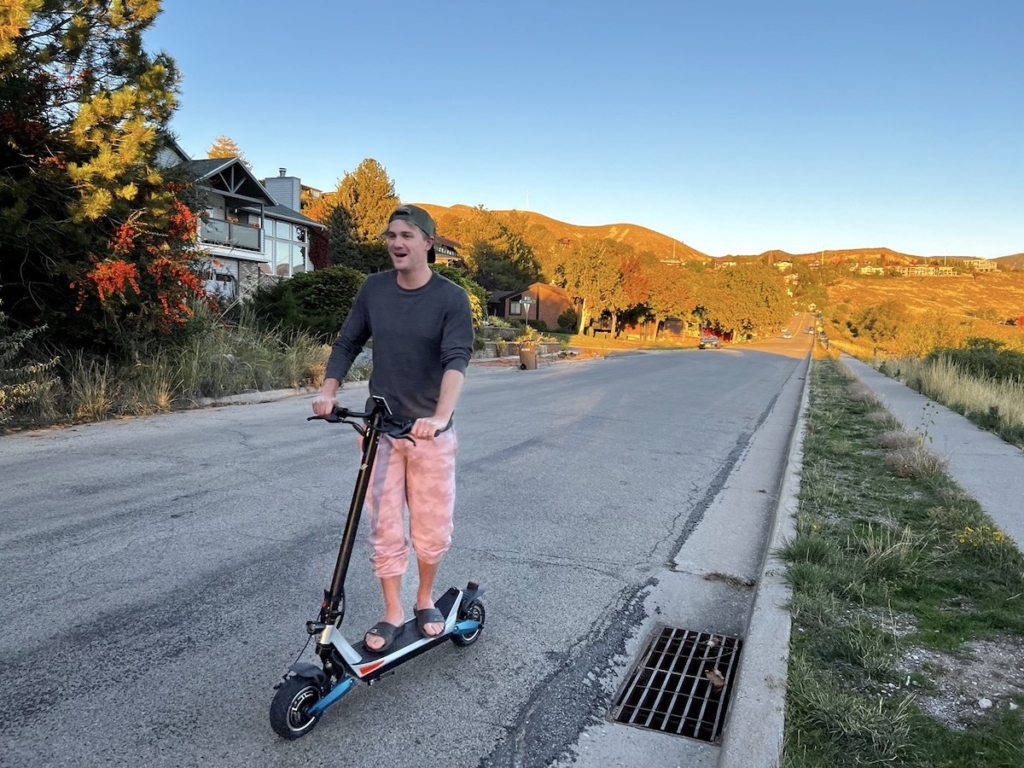
Varla Pegasus vs Rentable Public E-Scooters
Public e-scooter brands such as Lime and Birdie don’t have much on the Varla Pegasus. Their max speed averages about 18 MPH, their tires are smaller and thinner (making for a bumpier ride), and they are rated for slopes of max 15 degrees, compared to the Varla Pegasus that can handle up to 25 degree slopes. The riding style of the Pegasus is less “casual” than that of a rentable e-scooter.
I live in a VERY hilly neighborhood, so the degree of slope that the scooters can handle matters a lot. I’ve ridden a Birdie scooter in this neighborhood and had to traverse the hills, weaving back and forth, in order for the Birdie to have enough power for me to make it up. I tried the Varla Pegasus on the same hill and it glided up with ease; no weaving necessary. It DID slow down, but that’s to be expected on a steep incline.
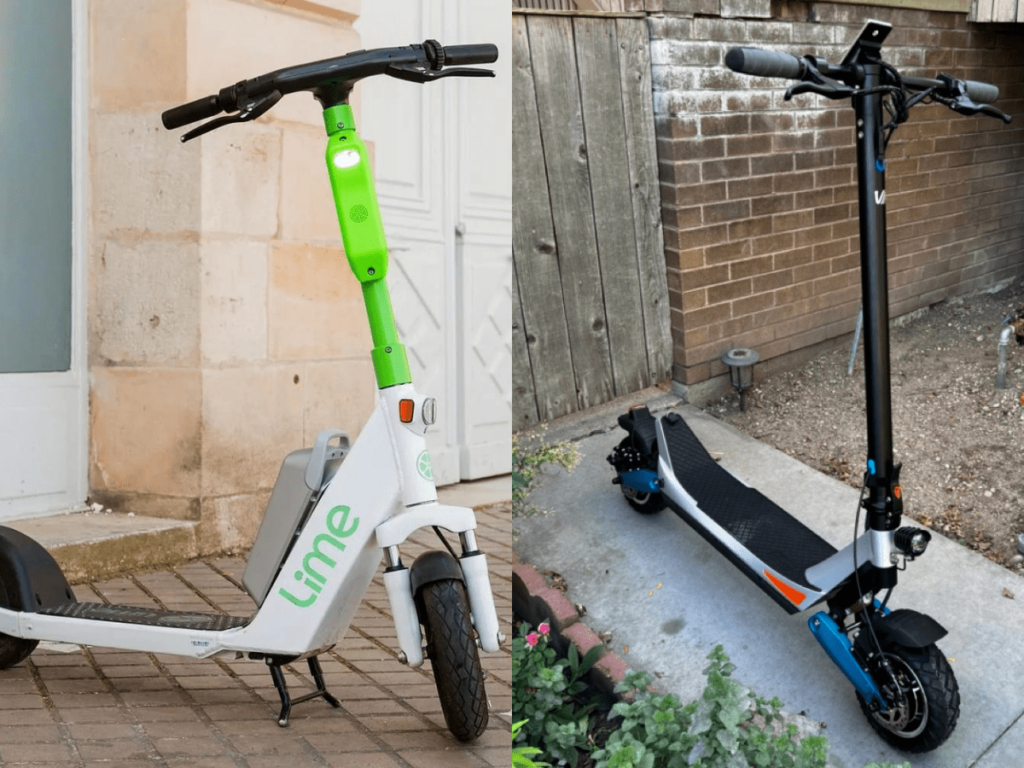
Can the Varla Pegasus E-Scooter Go Off-Roading?
It’s funny because the Varla Pegasus features make it seem pretty ideal for off-roading even though it’s technically just for city life. All-wheel drive, puncture-resistant tubeless tires, impressive suspension, a long deck for extra stability, raised-up pretty high for solid clearance. Yet, the Varla brand states that the Pegasus should NOT be used on gravel or dirt roads and kept away from rain. It makes me wonder how intense their off-roading Eagle One e-scooter must be!
But that’s the biggest setback of the Varla Pegasus for vanlifers: this escooter is technically not designed for off-roading. And for vanlifers who are frequently camping off public lands dirt roads or in the woods, you’d have to gamble on whether or not the escooter could handle it.
Final Thoughts: Varla Pegasus Review
The Varla Pegasus electric scooter is a great bang for its buck. Normally the Pegasus price is $1,299 but it’s currently on sale for $999–if you can get an e-scooter with this much pickup, durability and ride quality for under $1k, you’re doing something right.
Varla also includes 4 extra brake pads, a rugged lock clamp and keys, and a cute little handlebar bell. The biggest hangup for me as a vanlifer is its lack of portability since it weighs 66 pounds. But that’s not a dealbreaker because I can usually just wheel it down sets of stairs or curbs anyways, thanks to its high clearance, impressive suspension and solid tires.
